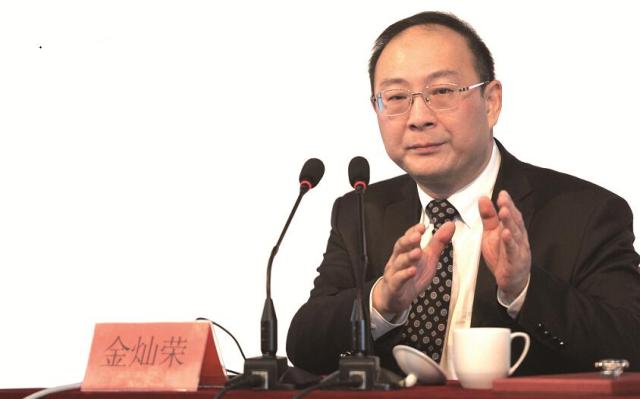Smaller powers can help ease tensions between China and the US. Britain, even after Brexit, is still the best positioned of these ‘bridge states,’ says international relations expert

The Industrial Revolution sequence featured as part of director Danny Boyle’s London Summer Olympics Opening Ceremony, July 27, 2012 / Photo by IC
Posts on China’s social media regarding Theresa May’s selection as the UK’s next prime minister ranged from the flippant to the focused. Some asked if the popular TV series Sherlock would still be available. Others speculated about whether Britain’s “second Iron Lady” would tighten student visa restrictions. Still others shared footage of David Cameron’s final Prime Minister’s Questions, or images of Larry the Cat, 10 Downing Street’s mouser-in-chief. The pundits, however, stuck to the financial implications of Brexit.
The foreign country that dominates China’s media cycle, for better or worse, has always been the US. Britain, thanks to the Brexit vote, has gained some ground. For presearchers, however, there is much more to Britain than Brexit. Jin Canrong, a professor at the School of International Studies of Renmin University of China and a prominent specialist on China’s foreign policy, has long been highlighting the special role of Britain in the China-US relationship.
In an exclusive interview with NewsChina, he explains why Britain is better positioned than other nations he terms “bridge states” in helping China and the US avoid the Thucydides trap – the conflict between a rising and an existing power. He does not think Brexit will break the “Britain bridge,” but may, in some ways, reinforce it. However, he also stressed uncertainty as to what extent the potential of the Britain bridge can ultimately be realized. He believes the history of Britain’s rise, rule and transfer of power is worth further research to provide lessons for China, the world’s rising power, and the US, which, for now, remains in the globe-straddling position once occupied by the British Empire.

Teddy Schwarzman (second from right), one of the producers of the British Oscar-winning film The Imitation Game, at the Shanghai International Film Festival, June 19, 2015 / Photo by cfp
NC: Specifically, what is the special role of the UK you refer to in terms of “easing the current tensions” between China and the US?
JC: China has proposed a vision of a “new type of major-country relationship” with the US on the basis of three principles: no confrontation or conflict, mutual respect, winwin cooperation and common prosperity. So far, Sino-US relations have followed a stable structure featuring both active cooperation and competition. However, it is true that competition is growing, even with tension in some areas, particularly the South China Sea issue. In this context, China hopes, and welcomes, a constructive, coordinating role for countries with good relations with both China and the US. Among these what I would call “bridge states,” notably Britain, Australia, Israel and South Korea, Britain is in the best position.
I believe Britain has been trying to [play this role], and there are three ways that [it can succeed]. The first is to convince China and the US to refrain from conflict when tension rises. Due to Britain’s global vision, developed from its long experience of global governance, advice proposed indirectly by expressing its own strategic views on global issues in leaders’ meetings with China or the US is, in most cases, respected. The second is the UK facilitating communication between China and the US from time to time. The third is the UK’s action in balancing China and the US. The UK’s participation in the Asian Infrastructure Investment Bank (AIIB) was crucial to encourage other developed countries to follow suit despite US opposition. The US refused the UK’s advice on the AIIB as the US underestimated China’s influence and was too ideologically oriented in its foreign policy. However, Britain takes the side of the US on the South China Sea issue. In this case, the UK is counterbalancing China. All of this shows that Britain takes actions based on its own judgment of both its national interest and the global situation. Such actions sometimes provide for a balance of power between China and the US.
NC: It is widely agreed that the UK’s strategic position in the eyes of the US would be weakened if the UK is no longer a member of the EU. Does this mean that the UK’s special role in Sino-US relations would also be weakened in the future? What other factors would hinder Britain?
JC: I don’t think Brexit will have a big impact at the end of the day. The world was psychologically shocked by the referendum result, so the markets fluctuated drastically. British politicians already regret the mess they created. They will try to use some complicated technical tools to minimize the possible damage to Britain so that the substance of Britain’s ties with Continental Europe will remain close. Britain’s influence on the EU will not be reduced to a scale smaller than that of the EU’s Eastern European members. Once the dust settles, we will find that the real damage is actually minor.
However, to what extent Britain can play its role [as a bridge between China and the US]also depends on another two factors. One is Britain’s leadership. [Margaret] Thatcher was certainly stronger than [David] Cameron. Britain also needs to put its own house in order first. It has to address pro-independence sentiment in Scotland and Northern Ireland, relations with the EU and economic growth. I am also quite concerned about the build-up of racial tension concerning Britain’s Muslim population.
NC: How can Britain benefit from playingthis special role in Sino-US relations?
JC: British strategists are clear that China and the US will be the two strongest powers in the world in the future. Maintaining good relations with both, which puts a country in a favorable strategic position in the global order, is what nearly all major powers aspire to do. This will make it easier for Britain to develop better economic ties with both the US and China. Social and cultural exchanges will also be stronger.
After Brexit, in particular, Britain will be more willing and able to develop special relations with China, and benefit from that. Britain’s ties with Continental Europe will be weakened, and Britain will probably suffer the loss of 10 to 15 percent of the total value of its economy as a result. It needs to find other markets to fill this gap. David Cameron said Britain would seek closer ties with the US, China and India after Brexit. In reality, the UK-US alliance is strong enough to remain a constant, not a variable. The Indian market is too limited to offer much. The biggest contribution would be from China, which has the demand for and is able to buy more British goods and services, and invest more in the UK.
At the strategic level, post-Brexit Britain will lose the EU platform, where Britain has its voice heard more clearly by the rest of the world. If Britain can maintain very good relations with both China and the US, it will secure global influence bigger than most other major powers.
NC: Can Sino-British relations develop to the same level as, say, Sino-German relations?
JC: China’s vision is to develop at least fairly good relations with all countries, including the US. However, there are different layers in this global partnership network. In terms of partnership with world powers, China’s relationship with Russia is currently in the lead, followed by its relationship with Germany. China has been developing partnerships with the EU as a whole and with its member states at the same time, often paying more attention to the latter in practice. Germany is China’s closest partner among EU member states. China and Britain have the potential to upgrade their relations to be equally close, potential made bigger by Brexit as Britain will have to be treated as an independent force in world affairs and will be free from the EU’s restrictions on foreign policy.
However, it is an exaggeration to define the Sino-British or Sino-German relations as “special,” as such a label is normally used in relation to the UK-US alliance [the special relationship]. It will never be possible for China to develop such strong ties with the UK or Germany.
NC: So we must not overestimate the UK’s role in mitigating Sino-US tension?
JC: Absolutely. Bridge states like Britain, Australia, Israel and South Korea can play a coordinating role in helping ease Sino-American tensions. It is down to China and the US themselves to decide the future of their relationship.
It is also important to note that there are a lot of uncertainties concerning whether the potential I have mentioned, including the role of bridge states and stronger relations with the UK, can be realized when global geopolitics is getting more complicated than ever.

Professor Jin Canrong, Renmin University of China / Photo by IC

 Old Version
Old Version


